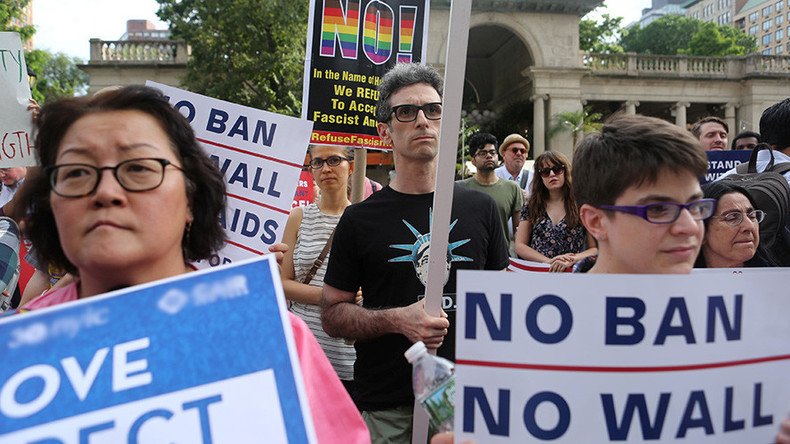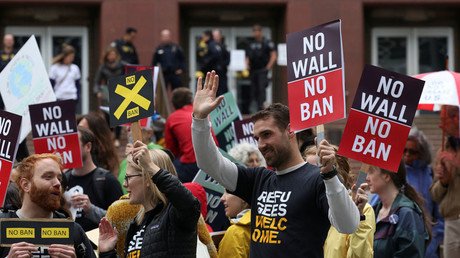Hawaii judge expands ‘close family’ exemption of Trump travel ban

A federal judge in Hawaii has expanded the definition of “close family” members who would be exempt from US President Donald Trump’s temporary travel ban, ruling that the State Department’s criteria went against common sense.
US District Judge Derrick Watson said that grandparents, grandchildren, brothers-in-law, sisters-in-law, aunts, uncles, nieces, nephews, and cousins should also be considered “close family members,” challenging the government’s narrower definition.
“Common sense, for instance, dictates that close family members be defined to include grandparents. Indeed, grandparents are the epitome of close family members. The Government’s definition excludes them. That simply cannot be,” Watson wrote in his ruling on Thursday afternoon ‒ around 11pm local time in Washington, DC.
The decision was hailed by Neal Katyal, former solicitor general in the Obama administration and one of the lawyers aiding Hawaii in the case, as well as the American Civil Liberties Union.
Sweeping victory in #hawaiivstrump just now. Court: "The government's definition represents the antithesis of common sense."
— Neal Katyal (@neal_katyal) July 14, 2017
Hawaii judge ruled that U.S. government can't restrict grandparents from entering under SCOTUS #MuslimBan order https://t.co/sEhHBwTF5l
— ACLU National (@ACLU) July 14, 2017
Watson also ruled that “assurance from a United States refugee resettlement agency” was the sort of “bona fide relationship” that would exempt a potential refugee from being barred from the US under the executive order, but stopped short of allowing a relationship with a US law firm to qualify.
The ruling was "fairly broad and something that would trouble me if it was as broad as reported," White House Homeland Security adviser Tom Bossert told reporters on Friday. The refugee part in particular could be interpreted as "so expansive as to cover every refugee," Bossert said, according to Reuters.
The administration will consult with lawyers and “decide whether this is another productive or unproductive step in this saga as we try to secure our country," Bossert told reporters aboard Air Force One.
Attorney General Jeff Sessions condemned the decision on Friday, saying that it was improper for a federal district judge to micromanage the administration’s decisions.
“By this decision, the district court has improperly substituted its policy preferences for the national security judgments of the Executive Branch in a time of grave threats, defying both the lawful prerogatives of the Executive Branch and the directive of the Supreme Court,” Sessions said in a statement. “The Supreme Court has had to correct this lower court once, and we will now reluctantly return directly to the Supreme Court to again vindicate the rule of law and the Executive Branch's duty to protect the nation.”
Hawaii’s Democratic attorney general originally sued the Trump administration over the travel ban, which applied to six majority-Muslim countries and refugee admissions, arguing it discriminated against a Muslim cleric’s mother-in-law. Watson sided with the state, and was backed by the 9th Circuit Court of Appeals.
The US Supreme Court sided with the government on June 26, allowing the ban to partially go into effect until a full hearing can be held in October. The ruling qualified the government’s ban to apply only to those without a “bona fide relationship” to US persons or entities, leaving it up to the government to define such relationships.
Justice Clarence Thomas lodged a partial dissent, noting his objection to the court “keeping the injunctions in place with regard to an unidentified, unnamed group of foreign nationals abroad.”
The compromise will invite “a flood of litigation until this case is finally resolved on the merits,” Thomas wrote. His dissent was joined by two of his fellow conservatives on the bench, Justices Samuel Alito and Neil Gorsuch, who was appointed by Trump earlier this year.
After the Supreme Court ruling, the State Department said the ban would not apply to citizens of the six countries who had a parent, spouse, fiancé, son or daughter, son-in-law or daughter-in-law, or sibling already in the US.
Watson initially rejected Hawaii’s request to expand the definition, but the 9th Circuit said he had the authority to interpret the Supreme Court’s order.
Hawaii Judge: Give me your grandchildren, sisters-in-law, aunts, uncles, nieces, nephews, cousins of U.S. persons, yearning to breathe free.
— Yoni Appelbaum (@YAppelbaum) July 14, 2017













